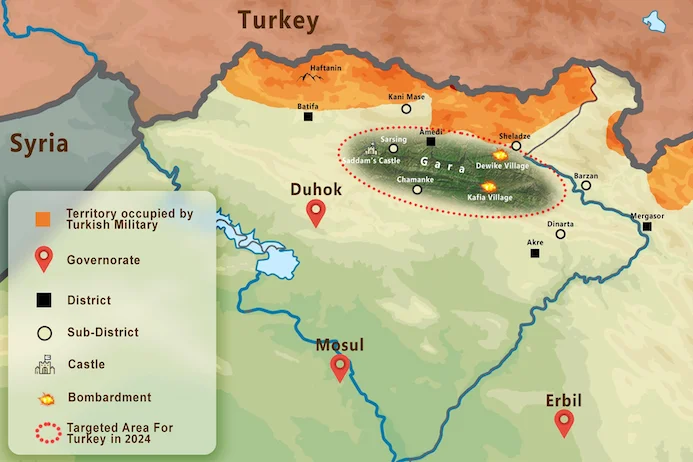The Platform
Latest Articles
by James Carlini
by Mohammad Ibrahim Fheili
by Nani Septianie and Albert Sibuea
by Humair Chaudhary
by Barshaneel Bora
by Jonathan Jung
by Ayesha Dawood
by Theo Casablanca
by Mohammad Ibrahim Fheili
by Sohail Mahmood
by James Carlini
by Mohammad Ibrahim Fheili
by Nani Septianie and Albert Sibuea
by Humair Chaudhary
by Barshaneel Bora
by Jonathan Jung
by Ayesha Dawood
by Theo Casablanca
by Mohammad Ibrahim Fheili
by Sohail Mahmood
The Spirit of the Ottoman Empire in Modern Turkey
08.30.2024
Turkey’s military operations in northern Iraq reflect its broader ambition to reassert Ottoman-era influence in the Middle East.
Since 2019, Turkey has escalated its cross-border military operations against the Kurdistan Workers’ Party (PKK) in the Kurdistan Region, a group Ankara has long branded as a terrorist organization. For decades, the PKK has waged an armed insurgency against the Turkish state, advocating for greater rights for Kurds. The conflict has become a defining element of Turkey’s modern geopolitical strategy, deeply rooted in the nation’s historical ambitions.
On April 17, 2022, Turkey launched Pençe-Kilit Operasyonu (Operation Claw-Lock). This military campaign continues unabated, targeting PKK strongholds in the Duhok Governorate, particularly in areas like Avashin, Zep, and Metina. Turkish forces advanced 15 kilometers into Iraqi Kurdistan, establishing military bases, outposts, and checkpoints. Today, Turkey maintains 78 military bases in northern Iraq—an expansionist move primarily ignored by the mainstream media.
Turkey’s ambitions extend beyond mere counterterrorism; this is an invasion by another name. The primary goal is to seize control of the Gara Mountains in Duhok Governorate by year’s end, a region perceived as a haven for PKK fighters. Ankara’s broader objective is to create a “security corridor” in the Kurdistan Region. In July, Yaşar Güler, Turkey’s military chief, explicitly stated that the mission aims to eliminate PKK fighters along the Iraq-Syria border and establish a buffer zone with a depth of 30 to 40 kilometers. A secondary objective is to prevent PKK fighters from escaping to Rojava and severing their connections with the People’s Protection Units (YPJ).
Since the operation’s inception, Turkey has conducted more than 230 airstrikes in Iraqi Kurdistan, primarily in the Duhok Governorate. These attacks have devastated local agriculture, with over 20,000 acres of land burned—collateral damage in Turkey’s broader regional agenda.

Yet, Turkey’s ambitions are not confined to combating terrorism. The actual prize lies further south: the city of Mosul, in northern Iraq, a geopolitical and geostrategic gem for Ankara. Historically, Mosul was part of the Ottoman Empire’s Mosul Vilayet, which included the Kurdistan Region. Although the Ottoman Empire dissolved in 1922 after a 600-year existence, the modern Turkish state continues to covet Mosul, treating it as a lost province waiting to be reclaimed. For Turkey, Mosul represents more than just a territorial gain; it is the key to its influence in the Middle East and is viewed as an extension of its national backyard.
Two factors underscore the strategic importance of Mosul for Turkey. First, control over Mosul is intrinsically linked to the balance of power between Sunni and Shia factions in Iraq. Mosul’s population includes many Turkmen, whom Turkey seeks to protect from perceived threats. Second, the western corridor of Mosul serves as a crucial pathway for Iran and its Shia allies to reach the Mediterranean Sea. Iran’s ambitions to use this corridor to establish the “Axis of Resistance” project directly challenges Turkey’s regional influence. Should this project succeed, it would cement Shia dominance, a scenario Turkey is determined to prevent.
Turkey’s expansionist dreams, cloaked in the rhetoric of counterterrorism, reveal a more profound longing for a return to Ottoman grandeur—this time, in a new guise. However, this is not merely about rekindling past glory; Turkey now faces a formidable regional rival in Iran. The stakes in this struggle extend far beyond historical nostalgia. The territories in question are pivotal in Turkey’s strategy to counter Iran’s threats and reassert its dominance in the Middle East.
Aland Dashti Sleman is a journalist with a Bachelor's degree in Political Science from Salahaddin University. He has garnered recognition for winning a research competition. On his podcast channel, The IR Zone, he discusses international relations, politics, and historical events in both Kurdish and English. Aland has also worked as a translator.